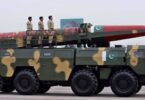WASHINGTON (AFP/APP): US lawmakers pleaded Tuesday for the evacuation of thousands of Afghan allies, fearing a bloodbath as America ends its longest war, but the administration said it did not want to set off a panic.
“We cannot allow Kabul to be another Saigon,” Representative Mike McCaul, the top Republican on the House Foreign Affairs Committee, referring to the chaotic helicopter lifts of people as US-allied South Vietnam fell in 1975.
McCaul showed a text message from a US Special Forces soldier about an Afghan commando who worked alongside him and was fearful that the Taliban will kill him after September, the deadline set by President Joe Biden for withdrawal.
“I’m concerned that his prediction — many predictions — will come through and these people will be slaughtered by the Taliban,” he said.
He said that the United States should consider airlifting Afghans with pending applications to a third country, such as Bahrain, Kuwait or the United Arab Emirates, for visa processing.
Zalmay Khalilzad, the US negotiator on Afghanistan, promised that the State Department would expedite visas but also warned against presuming “the inevitability of a worst-case outcome.”
“We don’t want to signal panic and the departure of all educated Afghans by worst-casing and undermining the morale of the Afghan security forces,” Khalilzad said.
“So this is a delicate, complicated balance,” he said.
“I personally believe that predictions that Afghan forces will collapse right away are not right.”
Representative Ami Bera, a Democrat, said there was a bipartisan consensus to get Afghan allies “out of harm’s way.”
McCaul and Representative Gregory Meeks, the Democrat who heads the committee, earlier told Secretary of State Antony Blinken in a letter that the United States has a “moral obligation” to speed up visa processing.
Biden has ordered a withdrawal by the 20th anniversary of the September 11, 2001 attacks that triggered America’s longest war, arguing that the United States has accomplished its primary goals in Afghanistan and can do little else.
Through a program launched more than a decade ago, the United States has authorized 26,500 immigration visas for Afghan interpreters, special operators and others who took risks to work with the United States.
Only 16,000 visas have been issued with 18,000 applications pending, meaning a backlog of more than two years, Meeks and McCaul sa






